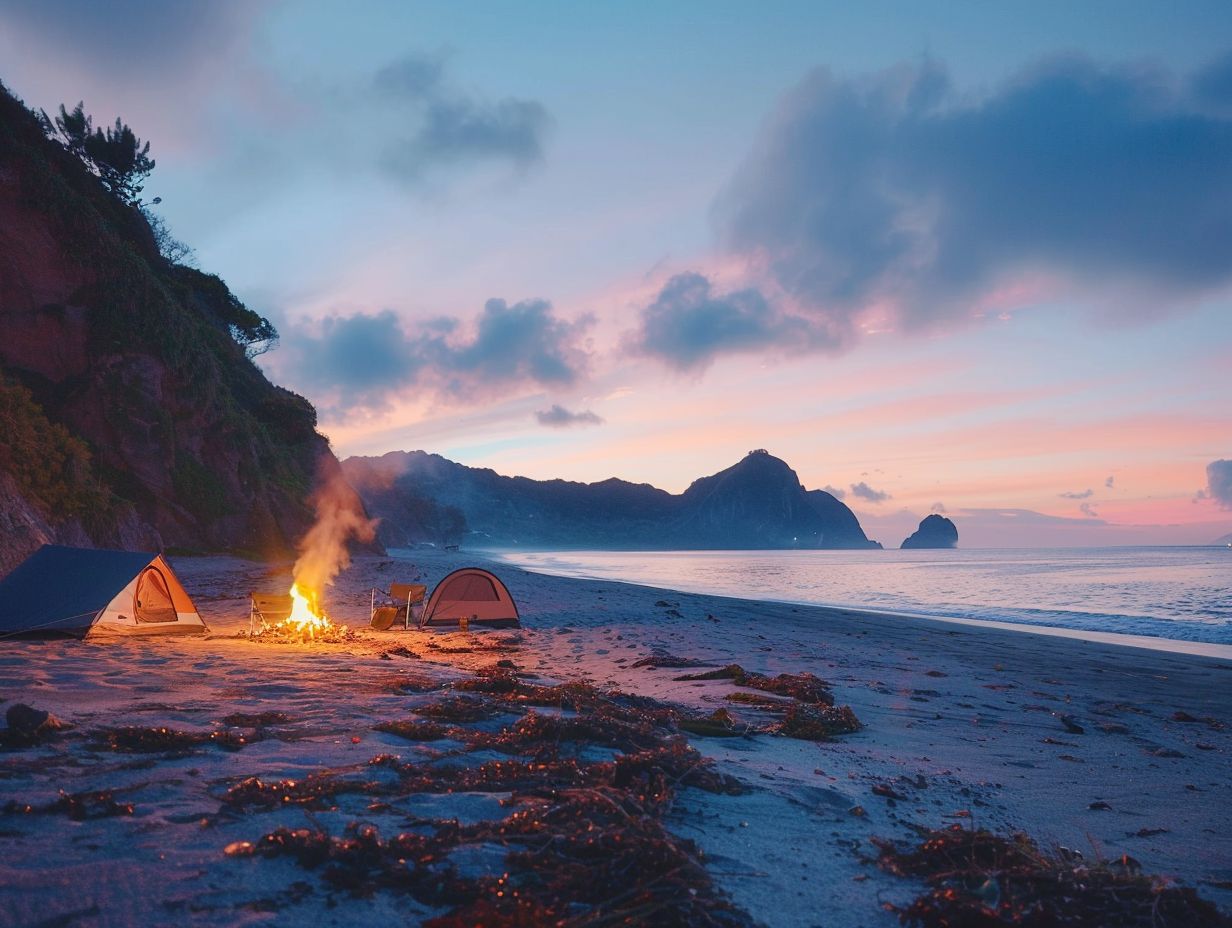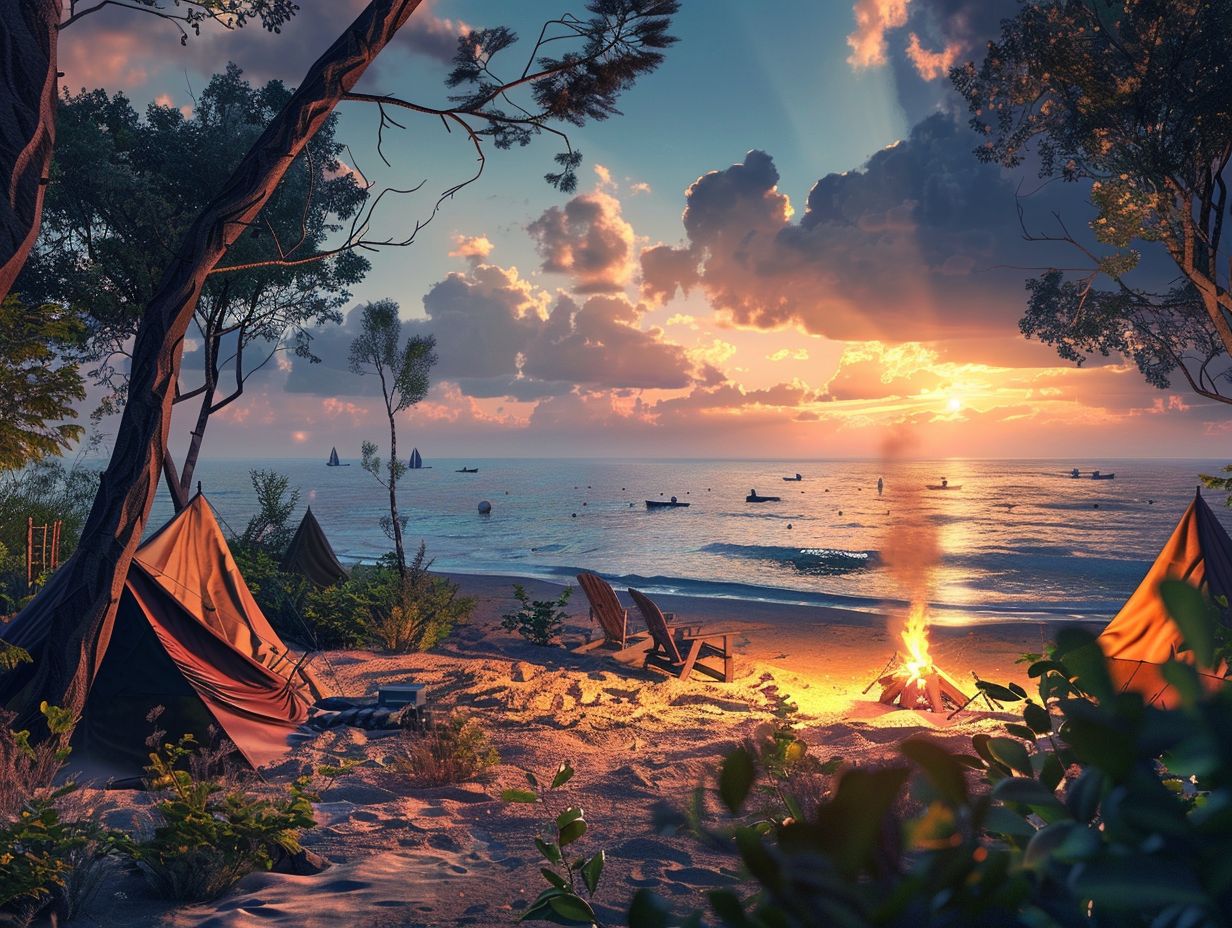Heading to the beach for a camping adventure? Before you grab your gear and head out, ensure you are prepared for a safe and enjoyable experience.
When it comes to beach camping, selecting the appropriate beach and adhering to fire safety protocols are essential aspects to consider. This article will provide you with comprehensive guidance on maximising your beach camping trip.
This includes protecting yourself from the sun, maintaining adequate hydration levels, and upholding environmental stewardship by leaving the beach in pristine condition.
Let’s delve into these important aspects to ensure your beach camping experience is both safe and rewarding.
Key Takeaways:

- Choose the right beach for a safe and enjoyable camping experience. Consider factors like weather, regulations, and wildlife before deciding on a location.
- Pack appropriate gear, including sunscreen and plenty of water, to protect yourself from the elements and stay hydrated during your beach camping trip.
- Practice leave no trace principles and respect other campers by keeping your campsite clean and properly disposing of waste. Leave the beach better than you found it for future campers to enjoy.
1. Choose the Right Beach
When selecting the perfect beach for your camping adventure, it is essential to consider various factors. Factors such as accessibility, amenities, and the type of terrain, whether sandy shores or rocky coastlines, all play a role in ensuring a memorable experience.
Secluded beaches can offer tranquillity and privacy, making them ideal for individuals seeking a peaceful getaway. Just imagine waking up to the soothing sound of waves crashing and birds chirping in the background.
On the other hand, family-friendly shores are a great option for those with children. These beaches provide a safe environment for kids to play in the sand and enjoy the water without any worries.
Certain beaches cater to specific activities such as fishing, where you can try your luck at catching dinner right from the shore. Alternatively, if surfing is more your style, there are beaches perfect for riding the waves.
Popular beach camping destinations like Big Sur in California or Hatteras Island in North Carolina offer unique experiences with their breathtaking landscapes and diverse recreational opportunities. Consider these factors when choosing the ideal beach for your next camping adventure.
2. Check the Weather Forecast
Before embarking on your beach camping trip, always check the latest weather forecast to prepare for potential challenges like strong winds, UV radiation, or sudden weather changes that could impact your safety and comfort.
Interpreting weather forecasts is key for making informed decisions about your activities during the camping trip. For instance, if the forecast predicts high winds, it might be risky to set up a large canopy or engage in water activities.
Planning activities according to the weather conditions can enhance the overall camping experience. Packing appropriate gear, such as wind-resistant tents or extra layers for sudden temperature drops, ensures that you are equipped to handle different weather scenarios comfortably.
3. Pack Appropriate Gear
Ensuring you have the necessary gear for beach camping is crucial to ensure a comfortable and safe outdoor experience. It is important to select the right equipment and pack appropriately to enhance your camping trip.
- When choosing a tent for beach camping, it is recommended to choose one that is lightweight yet durable enough to withstand the coastal winds. Opt for sleeping bags that are water-resistant and provide good insulation to keep you warm during potentially chilly beach nights.
- Compact and portable cooking equipment, such as a small propane stove or portable grill, is ideal for beach camping. Sun shelters can provide relief from the sun’s harsh rays, and it is essential to bring personal items like high SPF sunscreen and effective mosquito repellent to protect yourself from bugs in the evening.
Prioritising gear that is easy to clean and resistant to sand will help ensure a hassle-free beach camping experience. Selecting the right gear can significantly contribute to the enjoyment and safety of your beach camping trip.
4. Set Up Camp Away from the Waterline
When setting up your beach campsite, it is important to choose a location away from the waterline to mitigate potential hazards such as high tides, rogue waves, or shifting sands that could affect your safety and comfort throughout the night.
Moreover, aside from avoiding risks associated with coastal camping, choosing a secure spot inland can also help prevent unexpected water encroachment during high tide.
It is crucial to consider the direction of the wind to protect your campsite from strong gusts that have the potential to destabilise tents and scatter belongings.
To ensure the stability of your tent in windy conditions, use additional pegs and guy ropes to securely anchor it to the ground. Protect loose items by storing them inside the tent or in secure containers to prevent them from being carried away by gusty winds.
Prioritizing safety and comfort is essential when choosing your camping spot and implementing necessary precautions for a pleasant outdoor experience.
5. Follow Leave No Trace Principles
Adhering to Leave No Trace principles is essential for minimising your environmental impact while beach camping. You should always carry a rubbish bag, pack out all waste, and leave the natural beauty of the beach undisturbed.
Respecting wildlife and vegetation is another crucial aspect of responsible beach camping. You should avoid approaching or feeding wild animals to maintain their natural behavior and ecosystem balance.
It’s important to be mindful of where you set up camp to preserve fragile plant life and reduce your footprint on the environment.
Regarding campfires, you should consider using portable stoves instead of lighting fires directly on the beach. This eco-friendly alternative helps prevent damage to the sand and minimizes the risk of wildfires.
6. Be Mindful of Wildlife

Respecting the wildlife that inhabits the beach is crucial for your safety and the ecosystem’s well-being. Be prepared with mosquito repellent, avoid feeding animals, and follow guidelines to coexist harmoniously. Encountering insects like sandflies and mosquitoes is common at beach campsites, so having insect repellent handy is essential.
Keep an eye out for shorebirds such as seagulls and sandpipers that might swoop down to scavenge for food.
Regarding marine life, be cautious around jellyfish and stingrays. Remember to store all food securely in sealed containers to prevent attracting unwanted wildlife, and always admire animals from a safe distance to avoid any potential conflicts.
7. Protect Yourself from the Sun
Shielding yourself from the sun’s harmful UV rays is essential for a safe beach camping experience. It is recommended that you use sunscreen, seek shade during peak hours, and wear protective clothing to prevent sunburn and heat-related illnesses.
The intense sun exposure at the beach can have harmful effects on your skin and health if proper precautions are not taken. Sunburn, characterised by red, painful skin, is a common outcome of prolonged sun exposure. The risk of heat exhaustion increases when the body is unable to cool down efficiently.
To mitigate these risks, it is important to remember to reapply sunscreen every two hours, especially after swimming, wear a wide-brimmed hat to protect your face and neck, and drink plenty of water to stay hydrated in the heat.
8. Stay Hydrated
When beach camping, it is essential to maintain proper hydration levels, especially given the heat from the sun. You should ensure that you have an ample supply of fresh water, drink water consistently throughout the day, and take precautions to avoid the risks associated with dehydration.
A common guideline for determining your daily water intake is to consume a minimum of eight 8-ounce glasses of water daily. However, factors such as ambient temperature, physical activity, and individual metabolism may necessitate consuming more water. It is important to store water in clean, sealed containers to ensure its safety, and choosing BPA-free options is recommended.
Look out for signs of dehydration like dark urine, dry mouth, fatigue, and dizziness, and make sure to replenish fluids regularly to prevent dehydration.
9. Keep Your Campsite Clean
Maintaining a tidy campsite not only promotes comfort but also helps to preserve the natural beauty of the beach. You should use rubbish bags for waste disposal, keep food stored properly, and tidy up regularly to minimise environmental impact.
Organising your campsite layout effectively is another crucial aspect of maintaining tidiness. You should place rubbish bags in easily accessible locations and establish designated areas for different activities. By keeping a well-organised space, you not only make it easier to clean up but also reduce the chances of attracting unwanted wildlife.
Be mindful of waste management by separating recyclables from regular rubbish and following any specific guidelines provided by the camping site. Educating yourself on local wildlife habits and regulations can also help to prevent interactions that may harm both you and the animals.
10. Familiarise Yourself with Beach Regulations
Understanding and complying with beach regulations is crucial for a smooth and safe camping experience. Familiarise yourself with rules on camping, fires, wildlife interaction, and permitted activities to avoid any conflicts or hazards.
When setting up camp, always choose designated areas and follow the maximum stay limits to ensure sustainability and conservation of the beach environment. Be mindful of fire restrictions in place to prevent wildfires, using only designated fire pits if permitted.
Respect beach access rules, avoiding sensitive habitats and wildlife areas. Keep pets on a lead and clean up after them to maintain cleanliness and safety for all beachgoers.
Remember, these regulations are in place to protect the natural beauty of the beach for future generations to enjoy.
11. Practice Fire Safety
When enjoying a campfire on the beach, you should prioritize fire safety to prevent accidents and wildfires. It is important to follow proper fire guidelines, have essential firefighting equipment to hand, and never leave a fire unattended.
Ensure that you use a designated fire ring or create a safe fire pit away from flammable materials. Only use approved fuel sources such as firewood and avoid burning debris or rubbish. Remember to keep a bucket of water or a fire extinguisher nearby for emergencies and always fully extinguish the fire before leaving.
Be mindful of local regulations regarding campfires and consider wind conditions to prevent spreading sparks. Responsible campfire management is essential for enjoying a safe and enjoyable camping experience on the beach.
12. Be Prepared for Emergencies

When beach camping, it is crucial to anticipate and prepare for emergencies. Ensure you have a well-equipped first aid kit, are familiar with emergency contacts, and possess basic survival skills to effectively manage unexpected situations.
In your emergency kit, be sure to include essential items such as bandages, gauze pads, antiseptic wipes, scissors, tweezers, and painkillers. Additionally, pack a card with emergency contacts, including local authorities, emergency services, and family members.
Your survival tools should consist of a multi-tool knife, torch, matches, whistle, and emergency foil blanket. In case of injuries, promptly clean and dress wounds, elevate limbs to reduce swelling, and seek medical assistance if necessary.
Should the weather change suddenly, secure your tent, seek shelter, and stay updated on weather forecasts. If you become separated from companions, establish a meeting point, carry a whistle for signalling, and maintain a calm demeanour while conducting a search.
13. Respect Other Campers
Respecting your fellow campers’ space, privacy, and tranquillity is crucial for nurturing a harmonious camping community. It is important to keep noise levels to a minimum, adhere to quiet hours, and maintain a friendly and considerate demeanour towards others.
Along with these foundational principles, campers can enrich the overall camping experience by observing campsite etiquette and practising good neighbourly behaviour.
One essential tip is always to tidy up after yourself and leave communal areas in a better condition than you found them. Taking responsibility for shared facilities and being mindful of the needs of others can significantly contribute to fostering a positive camping environment.
Another critical aspect is engaging in open and respectful communication with fellow campers. Should conflicts arise, it is advisable to address them tactfully and strive for amicable resolutions to ensure that everyone can fully enjoy their time amidst nature.
14. Have a Plan for Waste Disposal
Proper waste disposal is essential for maintaining the beach’s aesthetics and safeguarding the environment. You should establish a waste management plan, opt for eco-friendly products, and prioritise recycling to minimise your impact on the shoreline.
When you separate recyclables such as plastic bottles, aluminium cans, and glass containers, you significantly decrease the waste that contaminates the ocean.
Choosing reusable items and refraining from using single-use plastics like straws and utensils can help reduce the overall waste generated during your camping excursion.
Additionally, composting food scraps presents an efficient method to responsibly manage organic waste and enrich the nearby ecosystem.
Leave the Beach Better Than You Found It
Leaving the beach in a better condition than when you arrived should be your primary objective as a responsible camper. Make use of beach trolleys for convenient rubbish removal, actively participate in clean-up activities, and serve as a role model to encourage others to embrace this eco-conscious approach.
By implementing proactive measures to maintain the pristine condition of beaches, you play a crucial role in safeguarding marine life and protecting delicate ecosystems. Involvement in structured beach clean-up programs not only aids in removing debris but also fosters awareness about the significance of sustainable behaviors.
Just envision the substantial impact if every beach visitor picked up even a single piece of rubbish! By sharing success stories in environmental conservation, you have the potential to motivate others to support the movement for a cleaner, healthier coastline.
Let us all contribute to the preservation of our beaches and leave a positive legacy for forthcoming generations to cherish and relish.
What Are the Benefits of Beach Camping?
Beach camping offers you a myriad of benefits, including unparalleled views and the relaxing sounds of the ocean. Engage in a variety of outdoor activities such as fishing, campfires, stargazing, and nature exploration while enjoying the convenience of your own temporary seaside retreat.
This unique experience allows you to disconnect from the hustle and bustle of daily life and fully immerse yourself in the natural beauty of the coastal surroundings. The soothing sound of waves crashing against the shore provides a tranquil backdrop, promoting a sense of relaxation and serenity.
Whether you enjoy lounging in a hammock with a good book or embarking on a beachcombing adventure to discover seashells and marine life, beach camping caters to a diverse range of interests.
Coastal campsites often provide amenities like shower facilities, picnic areas, and easy access to water activities such as swimming, surfing, and kayaking. This makes beach camping a popular choice for outdoor enthusiasts seeking a blend of comfort and adventure.
Frequently Asked Questions
What should I bring for a safe and enjoyable beach camping experience?

Some essential items to bring include a first aid kit, sunscreen, insect repellent, proper camping gear, plenty of water, and appropriate clothing for different weather conditions.
How can I protect myself from the sun while beach camping?
Wearing sunscreen, staying in the shade during peak sun hours, and wearing protective clothing such as hats and sunglasses can help protect you from the sun’s harmful rays.
Are there any safety precautions I should take while beach camping?
Be sure to always keep an eye on the tide and weather conditions, properly dispose of any trash to prevent wildlife encounters, and follow all camping rules and regulations set by the beach or campsite.
What should I do in case of an emergency while beach camping?
Make sure to have a plan in case of emergencies, including knowing the location of the nearest medical facilities and having a fully charged phone with you at all times. In case of serious emergencies, call 999.
How can I protect my belongings while beach camping?
Invest in a waterproof and sand-resistant bag or container to keep your valuables safe and dry. Additionally, always keep an eye on your belongings and never leave them unattended.
What are some fun and enjoyable activities to do while beach camping?
Some popular activities include swimming, fishing, hiking, beach games, and stargazing. You can also relax and enjoy the beautiful scenery, read a book, or have a bonfire with friends and family.



